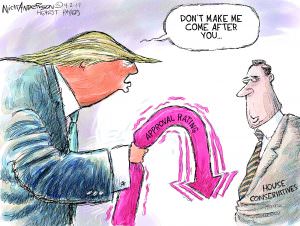Obama’s Tenuous Lead
If the election were held right now, President Obama would likely win by about the same margin that propelled him into office in 2008. But how fragile are his current advantages?
If the election were held right now, President Obama would likely win by about the same margin that propelled him into office in 2008. But how fragile are his current advantages?
The biggest concern for the Democrats (and the best hope for the GOP) is that the president’s lead is far from overwhelming, even though Republicans — and particularly Mitt Romney — have been badly weakened by their nomination battle, and Obama has been left largely unmolested by the conservative super PACs.
Democrats are certainly disappointed by the apparent fading of Rick Santorum in the final week before the Michigan primary and his surprisingly disjointed performance in last week’s debate. It’s not as clear to me as it is to others that Santorum would be less competitive than Romney as Obama’s opponent. What’s plain is that Democrats have an interest in the Republican contest going on indefinitely. Romney victories in Tuesday’s Michigan and Arizona primaries would likely shorten the process, and ending the nomination battle quickly is the precondition for a Republican counteroffensive.
They need one. Up to now, the Republican battle has played entirely into Democratic hands. The Democrats need upscale voters to cast ballots on the basis of social issues and a general revulsion over the Republicans’ lurch rightward. They need working-class whites to look past social issues and focus on economic inequality and the GOP’s continued insistence on cutting the taxes of rich people.
That’s exactly what’s happening. Obama won in 2008 even though he ran 18 points behind in the white working class. Until recently, he was drifting far lower than that, and Democrats were shellacked in House races in 2010 because they lost these voters by 30 points. Obama has now recouped the share he will need among blue collars — and in the process strengthened himself substantially in the Midwest — by making economic fairness a central theme of his re-election campaign. He’s been helped by a rise in public confidence that the economy is finally recovering.
In the meantime, Romney’s wealth and tax status, his private equity background, and his utter tone-deafness on matters related to class have all hurt him in the blue-collar world.
At the same time, social moderates — particularly women — have been appalled by the direction of the Republicans on issues such as contraception, and also by the sharp turn to the social-issue right by many Republican-controlled state governments. Virginia put itself at the center of this when its Legislature came close to passing a law that would have subjected women to a highly intrusive ultrasound before they could receive an abortion. National outrage led Bob McDonnell, Virginia’s Republican governor who would very much like to be his party’s vice presidential candidate, to scale back the bill’s requirements.
But the GOP’s self-correction in Virginia is also a warning for Democrats. Republicans, now aware that they are on a losing track, may begin to engineer a series of course changes. The fact that House Republicans reached agreement with the president to continue the payroll tax holiday is the clearest sign that the party realizes how a far more assertive Obama is dangerous to them in a way that the conciliatory Obama of last year’s debt-ceiling battle was not.
Moreover, while Obama’s lead in some polls is significant — in Friday’s Real Clear Politics poll averages he led Romney by five points and Santorum by six — his job approval ratings are still in the middling range. A recent Pew survey, for example, pegged his approval at 45 percent among independents, a big increase over his 37 percent rating last month, but far from commanding. Any reversal of the economic recovery could endanger even this level of support.
All of which explains why Romney desperately has to win Michigan this Tuesday and effectively shut down the nomination fight by the end of the Super Tuesday primaries on March 6. A Romney no longer driven by the need to pander to the right could regroup and reposition himself. He could spend some quiet time with his consultants who need to give him intensive retraining on how to talk to (and about) average Americans. And the super PACs, fueled by millionaires eager to avoid the tax rates Obama is promising, could fire away freely, field-testing messages and searching for the president’s points of weakness.
Obama is far better off than he was six months ago. But he cannot afford to go wobbly or to let the good news go to his head.
E.J. Dionne’s e-mail address is ejdionne(at)washpost.com.
© 2012, Washington Post Writers Group
Your support matters…Independent journalism is under threat and overshadowed by heavily funded mainstream media.
You can help level the playing field. Become a member.
Your tax-deductible contribution keeps us digging beneath the headlines to give you thought-provoking, investigative reporting and analysis that unearths what's really happening- without compromise.
Give today to support our courageous, independent journalists.






You need to be a supporter to comment.
There are currently no responses to this article.
Be the first to respond.